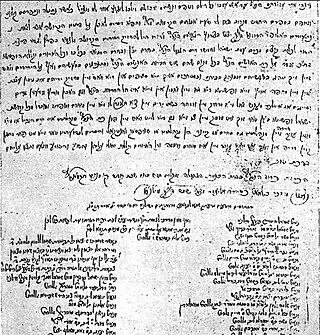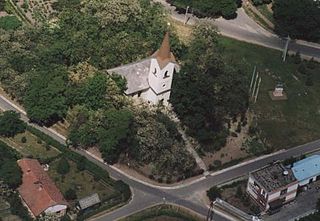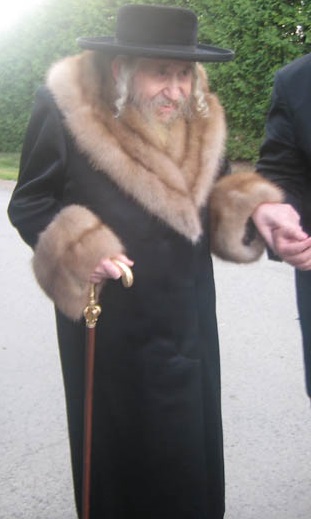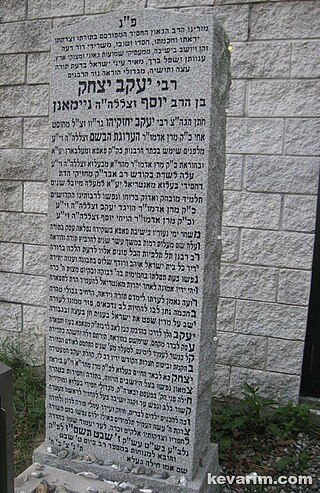Related Research Articles

Hasidism, sometimes spelled Chassidism, and also known as Hasidic Judaism, is a religious movement within Judaism that arose as a spiritual revival movement in the territory of contemporary Western Ukraine during the 18th century, and spread rapidly throughout Eastern Europe. Today, most of those affiliated with the movement, known as hassidim, reside in Israel and in the United States.

Chabad, also known as Lubavitch, Habad and Chabad-Lubavitch, is an Orthodox Jewish Hasidic dynasty. Chabad is one of the world's best-known Hasidic movements, particularly for its outreach activities. It is one of the largest Hasidic groups and Jewish religious organizations in the world. Unlike most Haredi groups, which are self-segregating, Chabad operates mainly in the wider world and caters to secularized Jews.

Misnagdim was a religious movement among the Jews of Eastern Europe which resisted the rise of Hasidism in the 18th and 19th centuries. The Misnagdim were particularly concentrated in Lithuania, where Vilnius served as the bastion of the movement, but anti-Hasidic activity was undertaken by the establishment in many locales. The most severe clashes between the factions took place in the latter third of the 18th century; the failure to contain Hasidism led the Misnagdim to develop distinct religious philosophies and communal institutions, which were not merely a perpetuation of the old status quo but often innovative. The most notable results of these efforts, pioneered by Chaim of Volozhin and continued by his disciples, were the modern, independent yeshiva and the Musar movement. Since the late 19th century, tensions with the Hasidim largely subsided, and the heirs of Misnagdim adopted the epithet Litvishe or Litvaks.
Neo-Hasidism, Neochassidut, or Neo-Chassidus, is an approach to Judaism in which people learn beliefs and practices of Hasidic Judaism, and incorporate it into their own lives or prayer communities, yet without formally joining a Hasidic group. Over the 20th century neo-Hasidism was popularized by the works of writers such as Hillel Zeitlin, Martin Buber, Abraham Joshua Heschel, Lawrence Kushner, Zalman Schachter-Shalomi, and Arthur Green.
Canadian citizens who follow Judaism as their religion and/or are ethnically Jewish are a part of the greater Jewish diaspora and form the third largest Jewish community in the world, exceeded only by those in Israel and in the United States. As of 2021, Statistics Canada listed 335,295 adherents to the Jewish religion in Canada. This total would account for approximately 1.4% of the Canadian population.

Ezekiel Hart was an entrepreneur and politician in British North America. He is often said to be the first Jew to be elected to public office in the British Empire,.

Tosh is a Hasidic dynasty originating in Nyirtass, Hungary. Today, it is based in Kiryas Tosh, Quebec, Canada, outside Boisbriand, Quebec, a suburb of Montreal, Quebec. The current leader is Grand Rabbi Elimelch Halevi Segal-Loewy, who succeeded his late father, Meshulim Feish Lowy, upon the latter's death on 12 August 2015. Tosher Hasidim have synagogues in the United States, in Boro Park, Williamsburg, Brooklyn, Kiryas Joel, and Monsey, as well as in Montreal and in London, England.

Nyírtass, formerly Tass, is a Hungarian village in Szabolcs-Szatmár-Bereg county. The village dates back to the 13th century; the name of the river Nyír was added as a prefix in 1908.
Gerhard Albert Baum, better known as Gregory Baum, was a German-born Canadian priest and theologian in the Catholic Church. He became known in North America and Europe in the 1960s for his work on ecumenism, interfaith dialogue, and the relationship between the Catholic Church and Jews. In the later 1960s, he went to the New School for Social Theory in New York and became a sociologist, which led to his work on creating a dialogue between classical sociology and Christian theology.
Allan L. Nadler is Wallerstein Professor Emeritus of Religious Studies and Former Director of the Jewish Studies Program at Drew University in Madison, New Jersey.

Kiryas Tosh, also called Tash, is a Hasidic Jewish community in the town of Boisbriand, Quebec. It is affiliated with the Tosh Hasidic dynasty. The community is home to about 550 households, or about 3,100 people.
Geneviève Zubrzycki is Professor of Sociology (2003–present) and Director of the Weiser Center for Europe and Eurasia, the Copernicus Center for Polish Studies, and the Center for European Studies at the University of Michigan. She is also affiliated with the Frankel Center for Judaic Studies at the University of Michigan.
Charles Shahar is a Canadian demographer. He is the chief researcher for Federation CJA, a Canadian Jewish organization based in Montreal, Quebec. Shahar has conducted studies on Canadian Jews, as well as the first comprehensive community study of Hasidic Jews in Canada. He has conducted a comprehensive series of analyses of the 2001 Census, and more recently of the 2011 National Household Survey, along various themes.

Rabbi Zalman I. Posner was an American rabbi and writer associated with the Chabad-Lubavitch Hasidic movement. Posner served as a congregational rabbi and community leader in the American Southeast for five decades, serving the Orthodox congregation Sherith Israel and founding an Orthodox Day School both in Nashville, Tennessee.

Meshulim Feish Segal Lowy II was the fourth Grand Rebbe of the Tosh Hasidic dynasty.
Gershon David Hundert is a Canadian historian of Early Modern Polish Jewry and Leanor Segal Professor at McGill University.

Rabbi Yaakov Yitzhak Neumann or Neimann, also known as "Pupa Rav," was the rabbi of Montreal's Belzer hasidim from 1953 until his death in 2007.
Lynn Rita Davidman is an American sociologist. She is the distinguished professor of modern Jewish studies and professor of sociology at the University of Kansas.
Kosher Love is a 2017 Canadian documentary film of love as understood by Orthodox and Hasidic Jews. The documentary was directed by filmmaker Evan Beloff and aired on the CBC-TV television channel. The film was also entered into Jewish Film Festivals in Canada, the United States, and in Poland.
Morton Irwin Weinfeld is a Canadian sociologist, who has conducted studies on Canadian Jewry. He is chair in Canadian ethnic studies and former chairman of the sociology department at McGill University.
References
- ↑ McMaster University faculty page.
- ↑ Robert J. Brym, William Shaffir and Morton Weinfeld. The Jews in Canada. Toronto: Oxford University Press, 1993.
- ↑ Shaffir, William. Life in a religious community: The Lubavitcher Chassidim in Montreal. Holt, Rinehart & Winston of Canada, 1974.
- ↑ Shaffir, William. "When prophecy is not validated: Explaining the unexpected in a messianic campaign." Jewish Journal of Sociology 37, no. 2 (1995): 119-136.
- ↑ Shaffir, William. "Separation from the mainstream in Canada: The Hassidic community of Tash." Jewish Journal of Sociology 29, no. 1 (1987): 19-35.